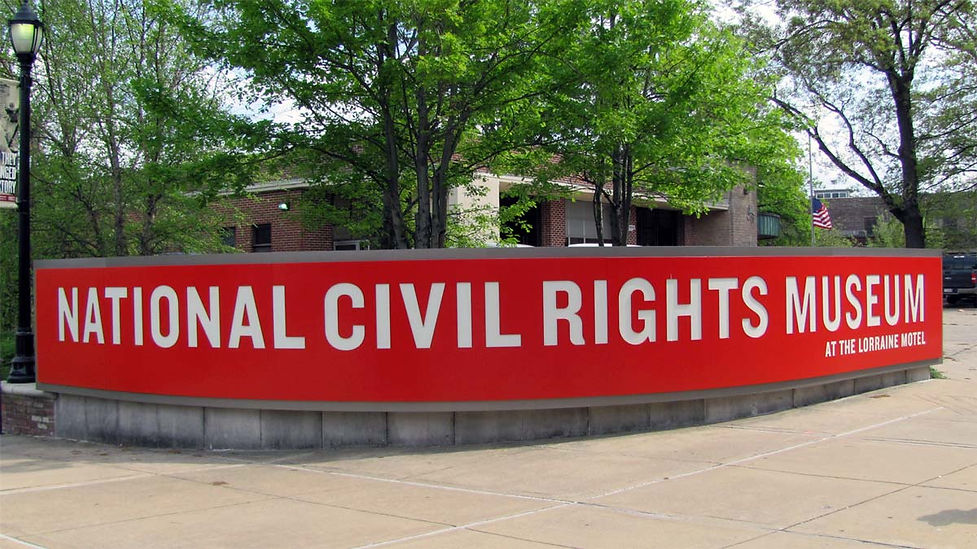
About the Museum
Noted as one of the nation's premier heritage and cultural museums, the National Civil Rights Museum in Memphis, Tennessee, is steadfast in its mission to share the culture and lessons from the American Civil Rights Movement and explore how this significant era continues to shape equality and freedom globally.
Established in 1991, the National Civil Rights Museum is located at the former Lorraine Motel, where civil rights leader Dr. Martin Luther King Jr. was assassinated on April 4, 1968. Through interactive exhibits, historic collections, dynamic speakers and special events, the museum offers visitors a chance to walk through history and learn more about a tumultuous and inspiring period of change.
To accommodate public demand for further educational opportunities, the museum underwent a $27.5 million renovation in 2013 and 2014, adding more than 40 new films, oral histories and interactive media to the already robust galleries. The result is a one-of-a-kind experience that has been featured on the History Channel and CNN, in USA Today and as the focus for the Academy Award-nominated documentary The Witness: From the Balcony of Room 306.
Additionally, the museum is among the top 5% of institutions to be accredited by the American Alliance of Museums and is a founding member of the International Coalition of Sites of Conscience, which brings together historic sites, museums and memory initiatives from all around the globe that connect past struggles to today’s movements for human rights and social justice.


The Lorraine Motel
The Lorraine Civil Rights Museum Foundation, DBA National Civil Rights Museum, is located at the Lorraine Motel in Memphis, the historic site where civil rights leader Dr. Martin Luther King Jr. was assassinated in 1968. In addition to housing one of the premiere cultural museums in the United States, the Lorraine Motel boasts an interesting story of its own.
Originally named the Windsor Hotel c. 1925
Renamed Marquette Hotel in 1945 and offered for sale
Purchased by Walter Bailey in 1945 and renamed the Lorraine Hotel, after his wife Loree and a song titled "Sweet Lorraine". At the time of purchase, the Lorraine included a cafe; and living quarters for the Baileys.
A two-story concrete block motel structure was built to the east of the hotel in 1955. It contained 16 rooms.
The Lorraine was one of only a few hotels to which African-American travelers could enjoy overnight accommodations during the segregated eras leading up to the late 1960s in America.
Under the Baileys' ownership, there were at least two major additions to the hotel– first, a second floor with 12 rooms and later, more guest rooms and drive-up access. This change converted the Lorraine Hotel into a motel.
Guests of the Lorraine, both black and white, returned many times for its upscale atmosphere, home-cooked meals, affordable prices and reputation as a clean, safe environment.
Songwriters and musicians working with Stax Records were frequent residents of the Lorraine. Recording stars Ray Charles, Lionel Hampton, Aretha Franklin, Ethel Waters, Otis Redding, The Staple Singers and Wilson Pickett were among the many who stayed in the Lorraine during the late 1950s and early 1960s.
Dr. Martin Luther King Jr. stayed at the Lorraine Motel numerous times, especially when he came to Memphis in 1968 in support of striking sanitation workers.
The Lorraine Motel is designated an historic site by the Tennessee Historical Commission.

Hours
Monday 9 AM - 6 PM
Tuesday Closed
Wednesday 9 AM - 6 PM
Thursday 9 AM - 6 PM
Friday 9 AM - 6 PM
Saturday 9 AM - 6 PM
Sunday 9 AM - 6 PM
Closed EVERY Tuesday
Summer Extended Hours are 9:00 AM to 6:00 PM fromthe Friday prior to Memorial Day until Labor Day.
National Civil Rights Museum
450 Mulberry Street
Memphis, TN 38103
(901) 521-9699
